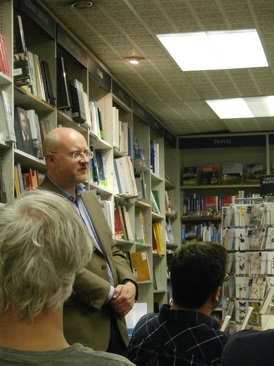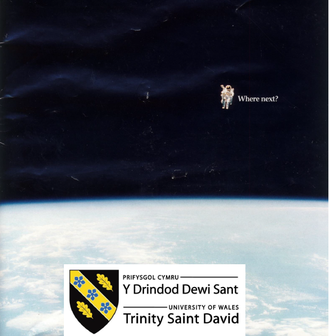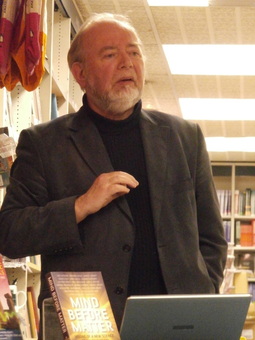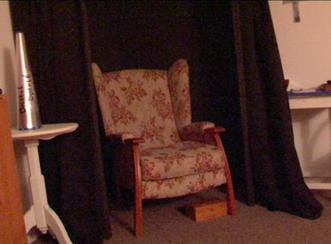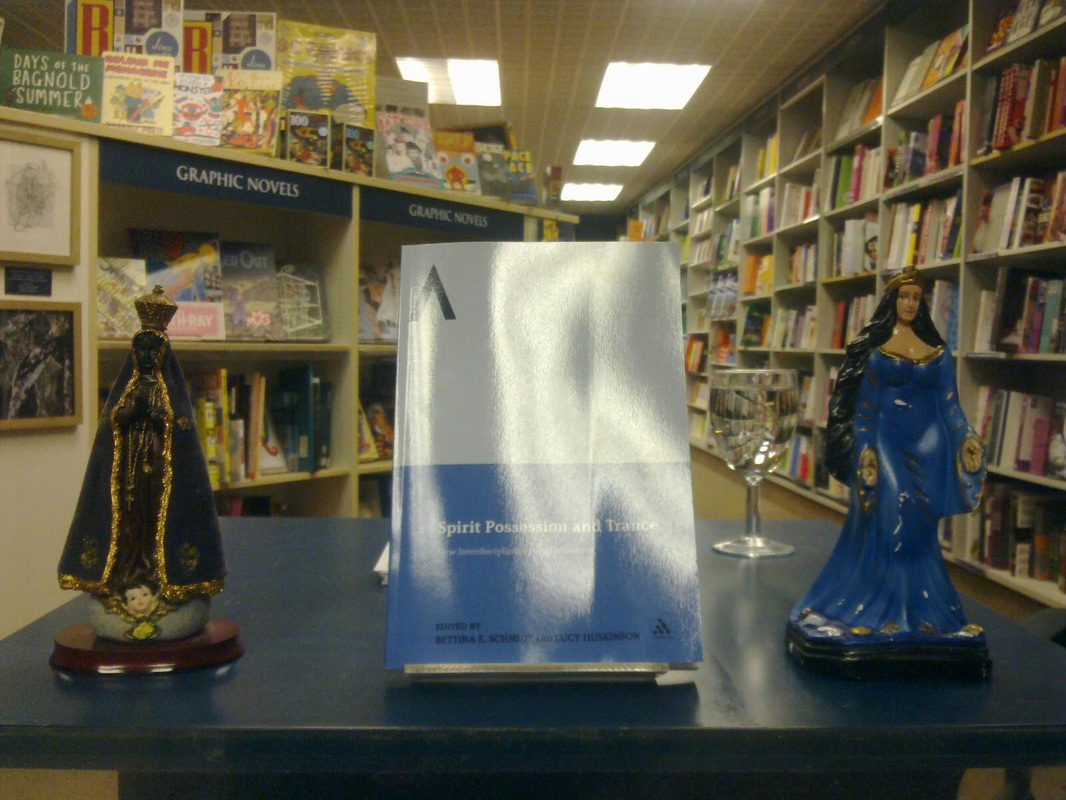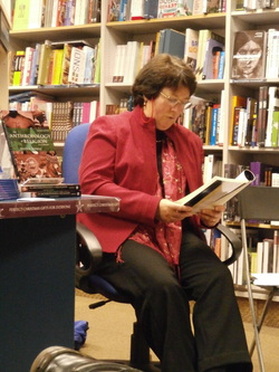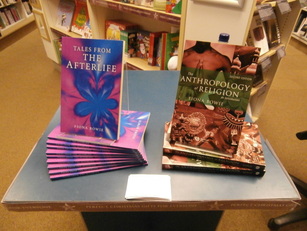Lecture Archive
May 29th 2013: Dr. David Gordon Wilson
|
'Why is Spiritualism a Shamanism, and What Does Foucault Have to do With It?'
This presentation demonstrates that Spiritualism is best understood as a traditional shamanism, as distinct from contemporary appropriations or neo-shamanisms. He argues that shamanism is the outcome of an apprenticeship in the management of psychic experiences, and which follows the same pattern as that of the apprentice medium. In doing so, Wilson offers fresh insights into the mechanisms that are key to sustaining mediumship as a social institution. Powerpoint:
| |||||||
April 24th 2013: Dr. Nicholas Campion
|
'Magic, Myth and the Space Race'
This talk examines some contexts for understanding the human exploration of near-space, the factual, the fictional and the boundary between the two. It considers the Russian cosmists, Soviet utopianism, the projection of American power, cinematic treatments of messages from heaven, environmental politics and planet Earth's inclusion in the classical celestial journey, and, not least Jack Parsons, the pioneer of American rocketry and practicing magician. Powerpoint Slides:
| |||||||
March 27th 2013: Paul Devereux
|
'Time, Mind and Place: The Archaeology of Consciousness'
Paul Devereux is co-founder and managing editor of the peer-reviewed TIME & MIND - The Journal of Archaeology, Consciousness and Culture, a research affiliate (2007-2013) with the Royal College of Art, and archaeology columnist with Fortean Times. He has written over two dozen books since 1979, which has kept him pretty busy! He also gives lectures,presentations and workshops in the UK, Continental Europe and the USA. His main research interests include the study of ancient sacred sites and landscapes, sound at archaeological sites, and the anthropology of consciousness (ancient worldviews) along with modern consciousness studies. He has visited many monuments and ancient places around the world, and has directly experienced some strange phenomena, so his research interests are not merely academic. In his books he maintains a factual basis without shying away from challenging subject matter. Read more: http://www.pauldevereux.co.uk/ http://www.landscape-perception.com/ http://www.bloomsbury.com/uk/journal/time-and-mind |
March 9th 2013: Jack Hunter
Presentation originally given at 18th Joint Postgraduate Religion & Theology Conference, University of Bristol
|
'Mediumship & Folk Models of Mind and Matter'
This presentation explores the role of experience with trance and physical mediumship in the development of folk models of mind and matter, at a non-denominational spiritualist home-circle. Mediums and sitters often claim that mediumship has led them to understand the world differently, and to appreciate that the standard materialistic view of science is inadequate as an all encompassing model of reality. These themes are explored through ethnographic interviews with mediums and sitters at the Bristol Spirit Lodge, following a brief introduction to the history of Spirituatlism and physical mediumship. |
| ||||||
February 27th 2013: Dr. Bettina E. Schmidt
|
Read more:
| |||||||
February 13th 2013: Dr. David Luke
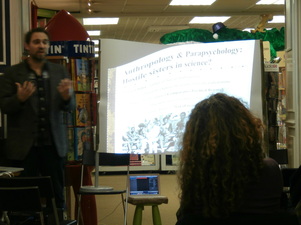
"Anthropology & Parapsychology: Still Hostile Sisters in Science?"
After a long, slow journey from the leather armchairs of its forefathers to out-of-body travels over Amazonian jungles, the anthropology of psi has progressed through a number of historical, methodological, and ontological developments. The course of this transformation from the detached and disbelieving dismissal of the occult to the engaged and emic entertainment of psi as a scientific possibility is discussed. Following a century of obscurity within anthropology, the notion of magic as psi finally found unique refuge within the anthropology of consciousness. Nevertheless, despite decades of research anthropological parapsychology can still be considered a completely nascent field of study and is speculated to remain so until its interdisciplinary imperative is actually fulfilled and its subject matter is shared fully by the disciplines that border it.
After a long, slow journey from the leather armchairs of its forefathers to out-of-body travels over Amazonian jungles, the anthropology of psi has progressed through a number of historical, methodological, and ontological developments. The course of this transformation from the detached and disbelieving dismissal of the occult to the engaged and emic entertainment of psi as a scientific possibility is discussed. Following a century of obscurity within anthropology, the notion of magic as psi finally found unique refuge within the anthropology of consciousness. Nevertheless, despite decades of research anthropological parapsychology can still be considered a completely nascent field of study and is speculated to remain so until its interdisciplinary imperative is actually fulfilled and its subject matter is shared fully by the disciplines that border it.
November 28th 2012: Dr. Fiona Bowie
|
"Sixth Sense, Psychometry & Spirits of Place: Everyday Experience of Invisible Forces in Contemporary Britain"
The Lecture explores the common, everyday end of the psychic spectrum in contemporary Britain. Many people claim to have a ‘gut feeling’ about something, have a pre-cognitive dream or intuition, or get a particular sensation when walking into a building or visiting a certain location. We may have knowledge of somebody or some event when making contact with a physical object associated with them or it. Having such experiences is not necessarily associated with any particular belief in the paranormal. This raises the issue of the rationalisation of psychic experiences within a secular society. Rationalist, materialist discourses dominate much of the media and academia, but exposure to a coherent system of explanation, such as that given by Theosophy or Rational Spirituality, can lead to a gradual or sudden interpretive shift. Instead of viewing psychic experiences as psychological, neurological or metaphorical, they may be seen as real events, external to the individual psyche. Many of those who testify to such experiences do so within a broadly scientific rather than religious, faith-based paradigm. Contemporary physics and cosmology are seen as proposing an expanded view of the universe that can accommodate what have hitherto been regarded as religious, metaphysical or spiritual experiences. Accounts of phenomena such as déjà vu or precognition, encounters with non-human beings or telepathic communication may be universal, but rationalisations of such phenomena change in line with other aspects of contemporary life and thought. Listeners are invited to participate in the session by bringing with them examples of such phenomena from their own experience, and to think about the interpretive frameworks used to account for them (if any).
| |||||||
October 31st 2012: Prof. Ronald Hutton
"Modern Paganism & Witchcraft" - No Audio Available.
Afterlife Research Centre Workshop 2011: Ethnographic Approaches to Mediumship
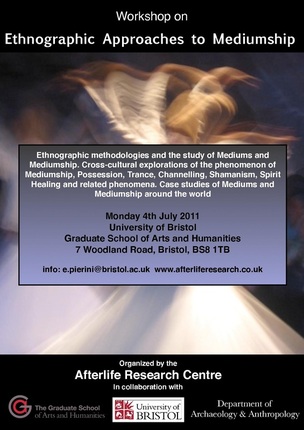
Featuring presentations from:
Jack Hunter on 'Mediumship, Trance and the Afterlife'
Carine Plancke on 'Restoring the Relation to the Spirit World: Violence and Desire in Punu Trance-dance Performances'
Hannah Gilbert on 'Spiritual Experience and Identity in Modern British Spirit Mediumship'
Terence Palmer on 'Spirit Possession and Telepathic Hypnosis'
Emily Pierini on 'Master Sun, Master Moon: Complimentary Forms of Mediumship Among the Jaguares of the Vale do Amanhecer'
Bettina E. Schmidt on 'The Discourse of Being "Possessed" in Brazil: Speaking About Mediumship, Trance and Possession in Afro-Brazilian Religions'
Jane Derges on 'Sensing the Divine: Illness and Meaning Making Amongst Members of an Anglican Spirituality Group'
Gregory Shushan on 'Shamanism, Near-Death Experience, and Afterlife Conceptions in Indigenous Societies: A Theoretically Eclectic Ethnohistorical Approach'
Fiona Bowie on 'Afterlife Geographies and the Nature of Evidence'
Follow the link below to be taken to the recordings:
http://afterliferesearch.weebly.com/arc-workshop-2011.html
Jack Hunter on 'Mediumship, Trance and the Afterlife'
Carine Plancke on 'Restoring the Relation to the Spirit World: Violence and Desire in Punu Trance-dance Performances'
Hannah Gilbert on 'Spiritual Experience and Identity in Modern British Spirit Mediumship'
Terence Palmer on 'Spirit Possession and Telepathic Hypnosis'
Emily Pierini on 'Master Sun, Master Moon: Complimentary Forms of Mediumship Among the Jaguares of the Vale do Amanhecer'
Bettina E. Schmidt on 'The Discourse of Being "Possessed" in Brazil: Speaking About Mediumship, Trance and Possession in Afro-Brazilian Religions'
Jane Derges on 'Sensing the Divine: Illness and Meaning Making Amongst Members of an Anglican Spirituality Group'
Gregory Shushan on 'Shamanism, Near-Death Experience, and Afterlife Conceptions in Indigenous Societies: A Theoretically Eclectic Ethnohistorical Approach'
Fiona Bowie on 'Afterlife Geographies and the Nature of Evidence'
Follow the link below to be taken to the recordings:
http://afterliferesearch.weebly.com/arc-workshop-2011.html
